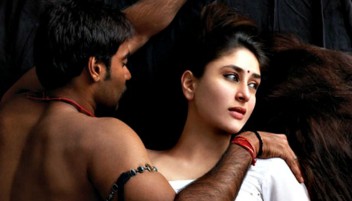From 27 -30 April, a festival of talks, screenings, workshops and a display of Indian Shakespeare movie memorabilia, will be held at the Asia House (27-29) and the BFI Southbank in London (29-30). The festival will explore and celebrate the link between Indian cinema and the playwright.
On a summer day last year, four female Shakespeare scholars met for brunch. The women- Thea Buckley, a doctoral researcher at the Shakespeare Institute, University of Birmingham; Koel Chatterjee, a doctoral candidate at Royal Holloway, University of London; Preti Taneja a Research Fellow in Global Shakespeare at Queen Mary University of London, and Warwick University and Varsha Panjwani, a lecturer and honorary research associate at the CREMS, University of York- have disparate tastes in cinema, but share a love and passion for the ways in which Shakespeare is becoming increasingly global. The four are particularly interested in how Shakespearian works have shaped and inspired Indian culture and art.
Their morning meal evolved into a day long discussion about the ways in which Indian cinema plays with and uses Shakespeare as creative fodder. Because the women come from different backgrounds and fields of study he event will explore a wide range of Indian cinema- not just Bollywood. And while “Indian Shakespeares on Screen” has only been in the works for about a year, the women have been conducting research in their respective fields for years.
“All of us have been engaged with this field in one way or another for a long time before we decided to loop our strengths and interests together.” Varsha said.
From Koel’s research on Bollywood Shakespeare, to Thea’s work in South Indian Shakespeare and Varsha’s studies on Shakespearean stage and screen adaptations to Preti’s work on Shakespeare in post-conflict zones, the women each have something unique to offer. The diversity of interests and research that each scholar brings to the table will certainly add to the richness of the festival.
While the link between Shakespeare and India may seem a little unclear or obscure to many, there is actually a quite strong and layered history behind the relationship. When India was under British rule, T.B. Macaulay brought Shakespeare to the country in an attempt to suppress Indian languages and literature. In an ironic turn of events, Indians adopted Shakespeare as their own and used his work and stories to enrich their art and celebrate their culture. Today, Shakespeare is, in effect, an extension of Indian culture and is a cornerstone of Indian cinema. His work has been translated into local languages like Gujarati, Bengali, Punjabi, Hindi, and Malayalam and is considered to be just as much an Indian icon as he is a British one.
“Indian Shakespeares on Screen” will celebrate this relationship and educate attendees about the ways in which Shakespeare has made his mark on Indian culture and cinema. From 27-29 April, a series of lectures and talks with topics like Bollywood adaptations of Shakespeare and a discussion of a new cinematic adaptation of Titus Andronicus, called The Hungry, will be held at the Asia House.
On 29-30 April, the BFI will host viewings of Vishal Bhardwaj’s films, Maqbool (Macbeth), Omkara (Othello) and Haider (Hamlet). The scholars agree that Bhardwaj’s internationally acclaimed Shakespeare films are the best adaptations of the plays that they have ever seen. The viewings will be followed by Q&A’s with the director and the screenwriters of the three films.
“Vishal Bhardwaj is notoriously media shy so it is a real coup that he agreed to attend. This is also the first event to fully include the script-writers as well as the director in the conversation about issues of adaptation and translation so there are many firsts to look forward to!” Varsha said.
In addition to drawing attention to an underrepresented field, the women are proud of themselves for pulling off the event as an all female group.
“As diaspora women scholars from diverse Indian states who not only wanted to introduce an entire range of Indian cinematic adaptations of Shakespeare to an international audience but were also keen to place these films at the heart of commemorative events around the 400th anniversary of Shakespeare’s death in 2016, we knew that we had our work cut out for us. It is tough in academia to garner support for projects run entirely by women so I am proud of what we have already achieved.” Varsha said.
The festival will be a delight for Shakespeare lovers and Indian cinema aficionados. In addition to learning from the lectures, attendees will have the rare opportunity to hear Bhardwaj speak and to ask him their questions.
“First and foremost, we want [attendees] to enjoy these beautiful and richly layered films but the way in which Bollywood particularly and Indian cinema generally is reconfiguring both Shakespeare and Indian identity is something that a multicultural society like Britain needs to engage with further.” Varsha said.
Indian Shakespeares on Screen will be held from 27- 29 April at Asia House and 29-30 April at the BFI Southbank.
Tickets for the Asia House lectures can be purchased here.
Tickets for the BFI film screenings can be purchased here.





